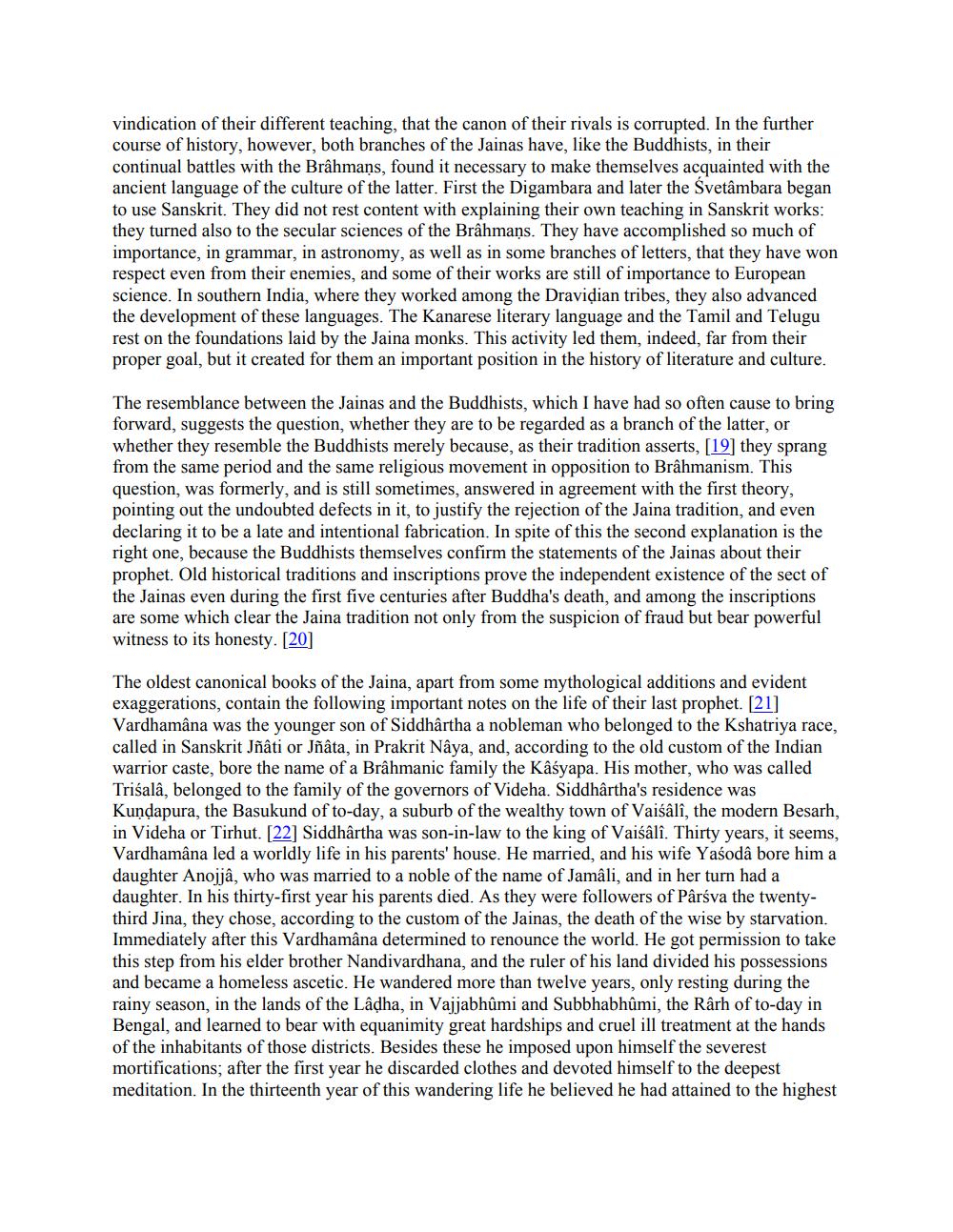________________
vindication of their different teaching, that the canon of their rivals is corrupted. In the further course of history, however, both branches of the Jainas have, like the Buddhists, in their continual battles with the Brahmans, found it necessary to make themselves acquainted with the ancient language of the culture of the latter. First the Digambara and later the Svetâmbara began to use Sanskrit. They did not rest content with explaining their own teaching in Sanskrit works: they turned also to the secular sciences of the Brâhmans. They have accomplished so much of importance, in grammar, in astronomy, as well as in some branches of letters, that they have won respect even from their enemies, and some of their works are still of importance to European science. In southern India, where they worked among the Dravidian tribes, they also advanced the development of these languages. The Kanarese literary language and the Tamil and Telugu rest on the foundations laid by the Jaina monks. This activity led them, indeed, far from their proper goal, but it created for them an important position in the history of literature and culture.
The resemblance between the Jainas and the Buddhists, which I have had so often cause to bring forward, suggests the question, whether they are to be regarded as a branch of the latter, or whether they resemble the Buddhists merely because, as their tradition asserts, [19] they sprang from the same period and the same religious movement in opposition to Brahmanism. This question, was formerly, and is still sometimes, answered in agreement with the first theory, pointing out the undoubted defects in it, to justify the rejection of the Jaina tradition, and even declaring it to be a late and intentional fabrication. In spite of this the second explanation is the right one, because the Buddhists themselves confirm the statements of the Jainas about their prophet. Old historical traditions and inscriptions prove the independent existence of the sect of the Jainas even during the first five centuries after Buddha's death, and among the inscriptions are some which clear the Jaina tradition not only from the suspicion of fraud but bear powerful witness to its honesty. [20]
The oldest canonical books of the Jaina, apart from some mythological additions and evident exaggerations, contain the following important notes on the life of their last prophet. [21] Vardhamâna was the younger son of Siddhartha a nobleman who belonged to the Kshatriya race, called in Sanskrit Jñâti or Jñâta, in Prakrit Naya, and, according to the old custom of the Indian warrior caste, bore the name of a Brahmanic family the Kaśyapa. His mother, who was called Trisalâ, belonged to the family of the governors of Videha. Siddhârtha's residence was Kundapura, the Basukund of to-day, a suburb of the wealthy town of Vaiśálî, the modern Besarh, in Videha or Tirhut. [22] Siddhartha was son-in-law to the king of Vaisali. Thirty years, it seems, Vardhamana led a worldly life in his parents' house. He married, and his wife Yasodâ bore him a daughter Anojjâ, who was married to a noble of the name of Jamâli, and in her turn had a daughter. In his thirty-first year his parents died. As they were followers of Parsva the twentythird Jina, they chose, according to the custom of the Jainas, the death of the wise by starvation. Immediately after this Vardhamâna determined to renounce the world. He got permission to take this step from his elder brother Nandivardhana, and the ruler of his land divided his possessions and became a homeless ascetic. He wandered more than twelve years, only resting during the rainy season, in the lands of the Lâdha, in Vajjabhûmi and Subbhabhûmi, the Rârh of to-day in Bengal, and learned to bear with equanimity great hardships and cruel ill treatment at the hands of the inhabitants of those districts. Besides these he imposed upon himself the severest mortifications, after the first year he discarded clothes and devoted himself to the deepest meditation. In the thirteenth year of this wandering life he believed he had attained to the highest




